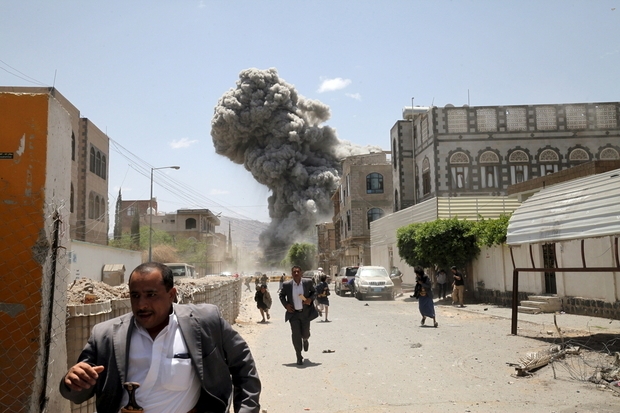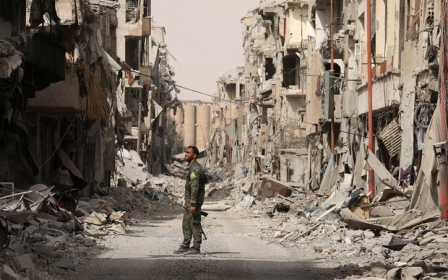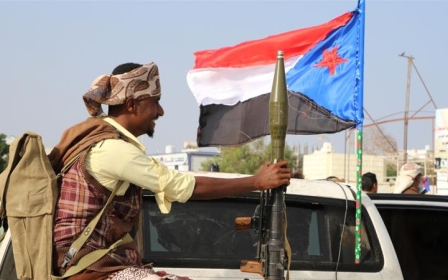Saudi Arabia ignores hundreds of civilian death reports in Yemen inquiry

LONDON - The Saudi-led coalition bombing Yemen is investigating less than 15 percent of more than 300 alleged violations of international humanitarian law carried out by its forces in the country, Middle East Eye can disclose.
The Ministry of Defence (MoD) in London is “tracking” more than 318 allegations of breaches of humanitarian law by the Saudi-led coalition, but the coalition’s incident assessment team in Riyadh has investigated just 41 reports of civilian casualties caused by air strikes.
The United Nations estimates that more than 10,000 people have been killed in Yemen since the bloody civil war begin in March 2015, and as many as 85,000 people have been displaced in the past 10 weeks alone in what has become the “world’s largest humanitarian crisis”.
More than 22 million people are in need of aid as the worst cholera epidemic of modern history has ravaged the country, however Saudi Arabia has resisted calls for an end to it’s three-year long bombing campaign.
Royal Air Force (RAF) liaison officers are based in the Saudi air headquarters in Riyadh to monitor operations, and the British government has licensed more than $6.3bn of weapons, including laser-guided bombs and missiles, to Saudi Arabia since the start of the conflict.
However, the MoD has declined to confirm whether British-supplied arms were involved in any of the allegations while rejecting called for an international inquiry into the allegations. Instead it has said that the Saudis must conduct investigations into allegations of humanitarian breaches.
Next month it is welcoming Saudi Crown Prince Mohammed bin Salman to London, prompting shadow foreign secretary Emily Thornberry to call on Prime Minister Theresa May to stop "bowing and scraping to Riyadh".
'Bowing and scraping to Riyadh'
Campaigners hope the visit will bring into focus UK arms sales rules, under which weapons must not be exported if there is a “clear risk that the items might be used in the commission of a serious violation of international law”.
The Saudi-led coalition set up an investigative mechanism, known as the Joint Incidents Assessment Team (JIAT) in 2016 after pressure from the UK and other allies, but the new figures revealed in response to a parliamentary question show that it has investigated just 41 alleged violations of international law, despite the fact that RAF officers in Saudi Arabia have recorded more than 318 incidents of concern.
The release of the figures has prompted the charged that UK ministers are using JIAT as a cover when challenged on Yemen, and as an excuse to continue lucrative arms sales to Saudi.
“Instead of using the JIAT as cover whenever challenged over Yemen, UK ministers should support moves to ensure there’s a proper international investigation of human rights violations on all sides to this conflict,” Allan Hogarth, Amnesty International UK head of policy and government affairs, told MEE.
He added: “The UK should also finally do the right thing and cease supplying arms to the coalition where there’s a clear risk they’ll be used to carry out further disastrous attacks in Yemen.”
The number of figures on the MoD “tracker” has likely increased since Foreign Office Minister Alistair Burt last updated parliament in November last year. The MoD said updated figures would be shortly.
Burt told parliament: “Royal Air Force liaison officers monitor Saudi-led coalition operations in Yemen and provide information to the UK Ministry of Defence. The liaison officers are not embedded personnel taking part in Saudi-led operations, they are not involved in carrying out strikes and they do not direct or conduct operations in Yemen. They are not involved in the Saudi-led coalition targeting decision-making process."
He added that these officers helped maintain a database, known as the trackers, which is used to inform the MoD’s advice to ministers over arms sales to Saudi Arabia.
'Not truly independent'
However, the low total of JIAT investigations has prompted renewed claims from a former cabinet minister that the Saudi-led coalition is effectively “marking its own homework”.
Conservative MP Andrew Mitchell, the former international development secretary, told MEE: “The concerns that are widely expressed that the rules of war are being breached and that subsequence inquires are not truly independent is yet another concern about an international catastrophe in Yemen which continues to gather pace.”
The coalition’s incident assessment team has also faced fierce criticism amid allegations of whitewashing in the reports it has carried out. This came after it found a string of deadly air strikes were justified, citing the presence of armed fighters at homes, schools and at medical clinic where two newborn babies were reportedly killed.
Andrew Smith, a spokesperson for the Campaign Against Arms Trade (CAAT), added: “Saudi Arabia cannot be trusted to run free and fair elections, or to observe the most basic human rights of Saudi people, yet Boris Johnson and Theresa May have entrusted it to investigate itself for war crimes. This total failure to hold itself to account should surprise absolutely nobody.”
Hogarth added: “Not only does the JIAT fail to investigate the vast majority of attacks, when it has carried them out its investigations have been notoriously threadbare, sometimes with barely a paragraph of text on specific attacks.
“The JIAT process appears to be less a genuine investigation process, and more a means of absolving the Saudi Arabia-led coalition of responsibility for its actions in Yemen.”
In a response to parliament this week Burt signalled the government still had faith in the JIAT system. He said: “The British government welcomes the release of these reports which demonstrate the Saudi-led coalition's continued willingness to conduct thorough, transparent and conclusive investigations into reports of alleged violations of international humanitarian law.”
MEE has contacted the embassy of Saudi Arabia in London for comment.
Middle East Eye propose une couverture et une analyse indépendantes et incomparables du Moyen-Orient, de l’Afrique du Nord et d’autres régions du monde. Pour en savoir plus sur la reprise de ce contenu et les frais qui s’appliquent, veuillez remplir ce formulaire [en anglais]. Pour en savoir plus sur MEE, cliquez ici [en anglais].




